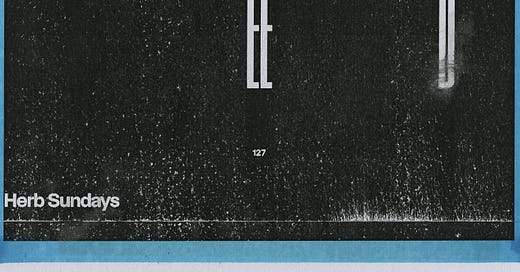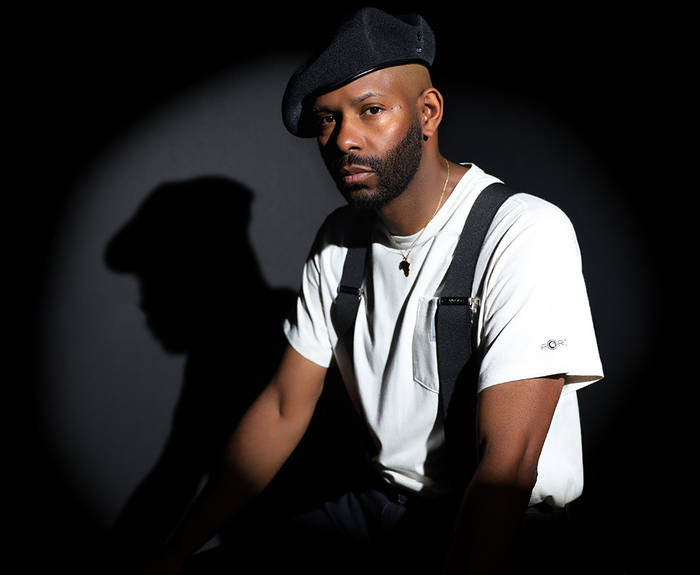Herb Sundays 127: Waajeed
The Detroit producer, DJ, and educator with a homespun mix + return of the "local" and scenes as the old/new frontier.
Herb Sundays 127: Waajeed (Underground Music Academy)
Apple Music, Spotify
Art by Michael Cina.
“When I think of why I admire Waajeed, I think of two qualities. One is quintessential Detroit: the roll-up-your-sleeves blue-collar work ethic. Shutting up to get shit done. It's in the projects he works on, now most obviously, the Underground Music Academy, where he is both conceptualizer and, among many things, carpenter. (I've been there as he literally built the walls.) That quality is also present in how he produces and mixes records, brick by brick, almost-no-thrills, but single-minded in sculpting a beautiful funk that both adheres to Detroit's techno tradition, and encompasses the breadth of Great Black Music.
Which brings me to the other quality: Waajeed's expansiveness and embrace of change. Here was a hip-hop/R&B producer, who took a mid-career (a relatively successful one at that) turn towards 4/4 rhythms, in a way that championed all of it rather than abandoning what came before. Waajeed's comfort with making a change that was stylistically radical (at least for the culture) but also natural for him as a person, showed that he wasn't going to get stuck, or pigeon-holed. In talking to him a lot over the last couple of years, I get the feeling this is a quality he learned early on from Amp Fiddler, the need to look inward to challenge yourself in order to evolve for the better, not simply have life driven by outside forces.”
- of Dada Strain (Herb 54) for Herb Sundays
Detroit’s Robert O’Bryant (aka Waajeed) is a producer, DJ, and radio show host, part of groups such as Platinum Pied Pipers and Tiny Hearts, and a producer for legendary groups like Slum Village. He formed the Bling47 record label group in 2002 and his acclaimed Dirt Tech Reck label in 2012, releasing projects by J Dilla, Waajeed, and various aliases himself and others. All of the above is more than enough for anyone, but factor in the photography/design, the DJ mixes, remixes, guest appearances, and more, and it’s a lifetime of work. And this says nothing about his activism and education work.
, a journalist I greatly admire, interviewed Jeedo on the subject for DJ Mag in 2023, and where his roots for education come from, leading to his role as founder and director of Detroit’s Underground Music Academy, an education hub building the future leaders of electronic music:“He gives much of the credit — for both a career in music and, years later, as an inspiration behind Underground Music Academy — to a pivotal player in the Detroit scene, the producer, musician, vocalist and songwriter Amp Fiddler. Waajeed went to school at Pershing High; Fiddler lived nearby, and the school kids would see him return from his musical travels on a tour bus. ‘We were like, ‘Holy fucking shit, is that a tour bus? In the middle of the hood?’”
Soon, Waajeed and his schoolmates got to know Fiddler, and eventually he began inviting the kids to his basement, where he’d show them the ins and outs of the MPC and other bits of gear.You just couldn’t come down to Amp’s basement with some bullshit,” Waajeed says. “You had to be studious, and you had to show progress in order for him to take the time out of his day. I mean, he’d let you use his drum machine for hours at a time. Underground Music Academy is very much a product of that — because what Amp did was, he lifted us. He was like, ‘You show up, and I’m gonna give you a shot. I’m gonna give you the space and time, and I’m not gonna hover over you, but I’ll help you figure it out.’”
Like many great musical cities, Detroit has survived through mentorship and community values. The idea of “scene” in music is sometimes somewhat limited as a party concept, but Waajeed, on top of his production, radio, and DJ duties, is focusing on one of the actual most important part elements of a scene: Mentorship. Detroit has long benefitted from this network of elders from the canonical record store clerks/ DJs like the late Mike Huckaby, who was an avid educator, and scene leaders such as Lavelle Williams (1967-2018), macro-level thinkers like BMG and his Interdimensional Transmissions unit, who have held together the concept of Midwestern dance music values with their No Way Back events, which build on international visitor traffic to Detroit’s Movement festival, created by Detroit Techno legends and now organized by Paxahau, who come from a long line of great Detroit promoters, the list goes on. One of my early mentors, House Shoes (Herb 44), fits into this tradition and was another early advocate of James Yancey/J Dilla alongside Waajeed. Dilla himself, perhaps Detroit’s most celebrated contemporary great, comes from, no surprise, Amp Fiddler's tutelage as well.
It’s the leadership in the culture that has been its competitive advantage. The most tangible legacy of spirit comes from the heralded Underground Resistance’s spirit and its visionary leaders like “Mad” Mike Banks, who also gave Waajeed space to dream, both via Submerge, Exhibit 3000, and Somewhere in Detroit, the distribution arm, museum, and record shop, where Waajeed has found growth and community too. Banks, a spiritual co-founder of UMA, has long envisioned this concept of regional education, and with the Academy, it has become manifest.
Mr Orlov who recently wrote about Waajeed for Artforum describes the confluence:
“But when a building two doors down from Submerge (the former local headquarters of the NAACP, no less) became available in 2015, Waajeed’s vision of how “Amp gave me an opportunity to the world” became the genesis for a new project. Other Detroit producers, most notably the late Mike Huckaby, had created mentoring programs, but Waajeed and Banks began thinking of this as a musical space for stories, “where one can go congregate in the same way you would in a church, or a barbershop or a beauty salon,” where a community’s past and potential future could align.”
While the music industry looks for its next big thing, the answer is perhaps: “local.” While there’s been the assumption that the vestiges of the local scene were dead (
has covered the topic) in lieu of the global, thanks to the reach of platforms like Boiler Room and social media writ large, there is increased desire to dig into community, not just as a buzzword, but a lifeline. The virtues of a scene have become more valuable as both a place to make your name, but also to evolve and grow, week over week.Fellow WDET DJ Zach Saginaw aka Shigeto (Waajeed holds down Weds, Liz Warner (Herb 28) does Thurs, while Zach covers Sat night) is another Detroit evangelist, throwing events and putting out local records through his Portage Garage Sounds label. Shigeto (who has an album out next month on Ghostly) posted a tweet recently that crystallized this mindset exceedingly well:
On a national media front as column inches get smaller and narrower, blogs and newsletters have enabled critics and artists to deliver more regional power including Mr Orlov’s Dada Strain,
’s , Zine/radio show/label Love Injection have become indespensible NYC outlets, to name a few. LA-based Passion Of The Weiss helmed by rabblerouser/true believer Jeff Weiss have become internationally appreciated outlets with a local bent, which end up informing national media. Couple that with the regional radio model of LA’s Dubab (celebrating 25 years this year, like Ghostly), NYC’s The Lot, London’s NTS, Detroit’s re-ignited terrestrial king WDET, and many more, add in a solid record store network, and you have the makings of real scenes again, borne from the ashes.But we need places to go, and people to learn from. UMA is part of a bigger movement to reconnect with the roots of Black American dance music, not just historically but philosophically and as a teachable concept for all. Beloved DJ/Producer/Educator King Britt has found further success with “Blacktronika: Afrofuturism in Electronic Music”, his course at University of California San Diego, where he’s a professor in the Computer Music department. Orlov continues:
“With “Blacktronika” and UMA, Britt and Waajeed are, in differing ways, displaying how Black music traditions are a guiding light for global sounds and local aspirations—not simply in the popular imagination or on dance floors, but as individualized self-realization. In Britt’s words, this music “threads together technology” with “innovation, the necessity for survival, for Black Joy, and bringing people together, while also [acting as] a political response to what’s happening.” The evidence can be found right there, in both men’s lives and careers. “
Waajeed described the UMA goals purely to WDET’s Ryan Patrick Hooper:
“We’re going to teach people how to DJ there. We’re going to teach people how to produce,” adds Waajeed, “but most of all, our curriculum is based in social justice. We want you to be a better person — not just thinking about making tracks, but thinking about making change.”
As canonical Techno fans know, its not a genre, its a way of being, a constant state of development, personal and otherwise.
Consinder Donating to Underground Music Academy or subscribe to their newsletter for upcoming class information.








